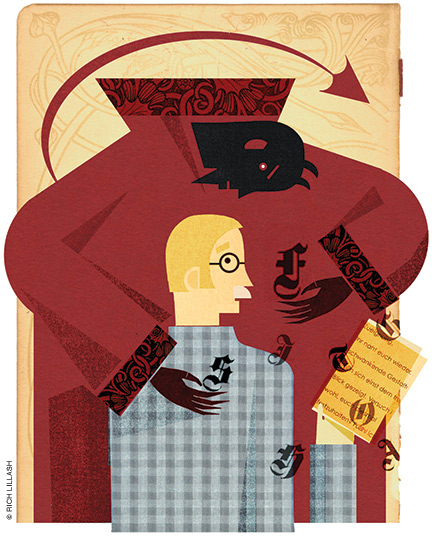
Tackling “perhaps the most formidable translation problem” in world literature.
By Eugene Stelzig
I recently completed a translation of the most famous work by the most famous German author, Faust, Part I by Johann Wolfgang von Goethe. It will be published this summer, joining a list of English versions that was already daunting well before I came along. Since its publication in 1808, Faust has been rendered in English almost too many times to keep track of. In 1932, a scholar judged Goethe’s masterpiece “perhaps the most formidable translation problem in all the literature of the world”—yet counted 44 complete attempts in English. There have been at least half a dozen since then, several of which remain in print.
So why go to the trouble of doing yet another one? Wouldn’t that arduous task be a wasted and redundant labor? Why re-translate a classic literary text that’s already available in multiple English versions?
One answer is a merely personal one: I was up for the thrill of the challenge. During a teaching career spanning four decades, I taught English versions of the play many times in undergraduate courses. On occasion I would compare passages with the German original, and the thought would occur to me that I could do better.To test if I was merely deluding myself, I had to give it a shot.
To render Goethe’s great play into English is at once a fool’s errand and a labor of love. The best recent English translation is David Luke’s 1987 edition—and as he put it eloquently, “in the end we must acknowledge again the inherent hopelessness of the whole attempt to find an English equivalent for poetry of this order.”
So, again, why even try—especially in light of Luke’s award-winning rendition? Let me invoke the authority of Goethe himself for the most fundamental justification. In an essay on Shakespeare, he asserted that “so much has already been said about [him], that it would seem that there’s nothing left to say, and yet it is the peculiar tendency of the spirit that it perpetually motivates the spirit.” The spirit of Goethe’s dramatic poem continues to speak to us in new and changing ways, as we and our world continually change.
With the exception of a single scene, Faust, Part I is in verse, and most of it in rhyme. However, to translate the play consistently using rhyme, as most of the translators, including Luke, do, forces them into a straitjacket and results in inevitable distortion of the meaning of the German text, dislocation of syntax, and extra wording in order to get the rhymes. The alternative—a prose translation—is tempting, and has been done (most ably by Stuart Atkins). But the problem is that Faust without rhyme isn’t really Faust; reading such a translation is like watching a color film in black and white. Thus in my rendering of the play I have chosen a flexible alternative, employing a more or less contemporary English with some use of rhyme to make the poetry memorable, but without any consistent use of or regular reliance on it.
My flexible approach of not doing a strictly rhymed translation is in keeping with Goethe’s expressed views on the translation of classic texts. In his autobiography, Poetry and Truth, he praised Wieland’s prose translation of Shakespeare’s plays as accessible to the reader, adding: “I honor rhythm as well as rhyme, through which poetry first becomes poetry, but that which is actually deep and fundamentally effective … is that which remains of the poet when he is translated into prose.” And when in 1830 he read a new French translation of Faust, Goethe praised it, “even if the greater part is in prose, as very effective.” He then added a remarkable declaration: “I don’t like to read Faust in German any more, but in this French translation everything appears entirely fresh, new, and witty.”
What this surprising comment suggests is that a translation, at best, can be a refreshed and revitalized version of the original. This may in practice be an impossible ideal, but it does reflect Goethe’s appreciation of such a task as a creative and regenerative process, and one that has the potential to even reinvigorate the source text. Goethe had a sophisticated and cosmopolitan understanding of literature, and his praise of the French translator (the poet Nerval) provides fuel for the argument that new translations of classic texts are necessary for new generations of readers precisely in order to bring to light anew their almost inexhaustible power. For them to stay relevant and fresh, and for their timeless and universal appeal to resonate in the here and now, they need to be re-translated—or re-created, as it were—every so often, again and again.
Eugene Stelzig C’66’s translation of Faust will be published in July by Bucknell and Rutgers University Press.





I agree that without rhymes Faust isn’t Faust.
I translated a few bits of it myself and think that it’s perfectly fine to keep it rhyming. It’s not a straight-jacket, but rather the clothes itself.